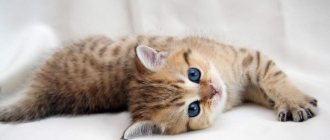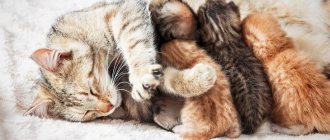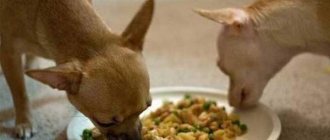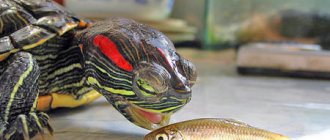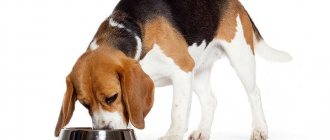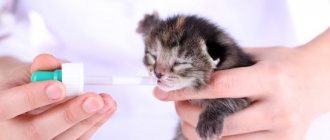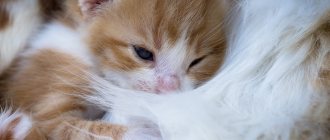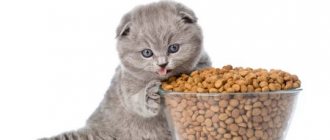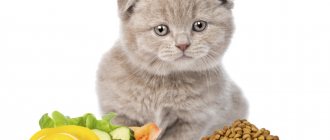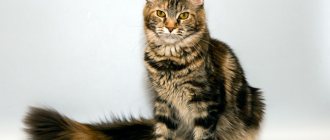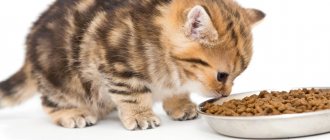The appearance of a small kitten in the house is not only joy for all household members, but also a great responsibility for the small defenseless creature. When looking at a fluffy baby, several questions arise at once: what can you feed a kitten at 1.5 months? What should you give a mustachioed baby?
Typically, kittens at the age of 1.5–2 months already eat on their own. After 2 months they are separated from the cat and given to other owners. Therefore, before taking a pet into your home, ask the former owners what they fed it. A new home, a foreign environment - all this is stressful for the baby. It will be good if he receives the usual menu for the first 7 days.
Kitten food
To form a healthy body, proper nutrition is necessary. It is important to know that new foods should be introduced gradually, depending on age.
Kittens up to one month old should be given liquid food. Experts advise using baby food for infants.
Never give your baby whole, undiluted cow's milk! Fat milk is difficult to digest, constipation may occur, and for some kittens it is contraindicated. 10% cream will replace mother's milk.
At one month of age, you can slowly begin to give kefir and cottage cheese, but in small quantities, thus moving from liquid to more solid foods.
What foods can be given at one and a half months?
Food for a kitten at 1.5 months is already much more varied than at one month. Meat is gradually introduced. It is advisable to start feeding a young predator with lean varieties of meat: chicken, beef.
Under no circumstances should you serve steamed or raw meat! It is best to boil it or scald it with boiling water - this helps to neutralize the product, the surface of which may contain various parasites.
All solid food must be processed in a meat grinder, because it is still difficult for the kitten to bite off a piece and chew it. Professionals advise giving kittens meat purees designed for infants; they are made from natural products.
The yolk of a chicken or quail egg is rich in vitamin E and is very beneficial for animals. But you shouldn't give them protein unless the kittens have diarrhea.
Feeding for a kitten at 1.5 months should be moderate, without overeating, so that the baby does not subsequently become obese. You shouldn’t overfeed it either: a lack of vitamins and exhaustion of the body can negatively affect the further development of the animal.
Ready diet
Having given preference to a ready-made diet, when choosing food, take into account the age, activity level, breed, and individual characteristics of your furry pet. Choose high-quality “premium”, “super-premium”, “elite” products marked “For kittens”. These foods are made from high-quality ingredients and contain all the necessary nutrients for the growth and development of your pet.
The best ready-made food:
- Hills.
- Royal Canin.
- Eagle Pack.
- Nutra Gold.
- Eucada.
- Akana.
The line of many brands includes dietary, therapeutic and prophylactic food, food intended for a certain age and breed. For kittens with sensitive digestion, use food labeled “Holistic”.
Cheap "economy" food contains harmful dyes, taste stabilizers, preservatives, dyes, have low nutritional value and can cause food allergies and intestinal disorders. Don’t believe advertising and don’t skimp on your pet’s health.
When feeding with ready-made food, the diet does not need to be supplemented with vitamin complexes.
Before purchasing food, carefully study the information on the label and the manufacturer’s recommendations. For the convenience of owners, the approximate daily dose is already indicated on the packages, taking into account the age of the cats.
Features of feeding a British kitten
All purebred animals have weak immunity and are categorically unsuitable for many of the things that barn cats can eat without any consequences. Therefore, you need to pay special attention to what to feed a British kitten at 1.5 months.
British kittens should start feeding from three weeks of age, without being separated from their mother. The longer she breastfeeds, the better and stronger the baby’s immunity.
If at the beginning of complementary feeding a mustachioed pet does not strive to eat other food, it means that he has enough mother’s milk. You can try giving new food after a few days.
So what should you feed a 1-5 month old British kitten when introducing a new product for the first time? Let's try to answer this question.
It is advisable to start with milk for kittens. Introduce cottage cheese without fruit additives, 10% cream, kefir, and baby milk porridge into your diet.
You can give the yolk, boiled or raw, mixed with sour cream or kefir
Don't forget that your pet is also a carnivore and needs to eat meat. At one and a half months, you need to gradually start giving him beef meat, twisted in a meat grinder or scraped (necessarily - frozen in the freezer or scalded with boiling water).
Complementary foods are given from 3 to 6 times a day. It depends on how often the cat feeds her kittens. This is how babies gradually give up natural breastfeeding.
Tips for feeding kittens at 1–1.5 months
Breeders and novice cat breeders often exchange experiences in keeping kittens on various forums. As a rule, beginners in this business make various mistakes. For example, some people feed their babies sour cream or sour cream, and abruptly replacing mother’s milk with unusually fatty foods leads to trouble.
There is no need to feed milk and sour cream, then there will be no diarrhea.
Nadja K, forum visitor
https://www.zoovet.ru/forum/?tid=7&tem=474920
And some simply share their personal experience in feeding small kittens.
Feed Hills. It is inexpensive and of normal quality. First for kittens, then for cats from 1 to 6, etc. The main rule: clean, fresh water should always be freely available! But only if you are going to keep the kitten on industrial food, you don’t need to give all sorts of vitamins and natural food. Because the gastrointestinal tract of cats is susceptible to changes in the consistency of food - you will get indigestion, at a minimum.
Wormwood, forum user
https://www.woman.ru/relations/medley4/thread/4497058/
Video: kitten eats independently for the first time
Baby food such as puree with meat is, of course, possible, but veterinarians do not recommend it, after all, this is food for children, not for kittens, there are no substances that a kitten needs. I have been feeding mine with Hilsom since I was 1 month old, at the beginning there was only canned food, diluted with warm boiled water, then I gave dry food for kittens, also with water, now the kitten is almost 8 months old, she eats everything too.
Lenka, novice forum user
You can also find a lot of tips and recipes on the Internet. Each recipe is the result of personal experience, built on trial and error.
I started feeding the kittens at three weeks old, starting with scraped meat, chicken and cottage cheese from a syringe. They are 5 weeks old today. They eat a children's version of “kunkina” porridge: grated beef + boiled carrots + chicken stomachs, chicken breast cut into pieces. They eat with pleasure until they are full. They don’t eat the cottage cheese themselves, and they spit out half of it from the syringe. I feed three times a day. In addition, they also apply to the mother.
Ashicoon, forum user
https://www.mainecoon-forum.ru/showthread.php?t=11520
Video: British kittens try mousse
It is difficult to feed kittens over 1 month of age, since they are still accustomed to cat milk. However, even if the cat does not refuse to feed her cubs, many owners still try to organize the first complementary feeding at 1 month (this is how the kitten is prepared for independent feeding). What exactly the first complementary feeding will be depends on what “policy” you follow for further feeding the animal. You can choose a quick way - ready-made food (mixtures, pates for kittens, dry or wet food). And some choose natural feeding. There are some rules that a kitten owner should remember. You also need to remember the list of permitted and prohibited products.
Scottish kitten nutrition
The best option is if the kitten feeds on mother's milk for up to 2 months until it gets stronger. Otherwise, he will have weak immunity, poor resistance to disease and difficulties in further development. At 1.5–2 months, complementary foods are gradually introduced. At this age, the baby eats 6 times a day.
What to feed a 1.5 month old Scottish kitten? Let's try to figure it out. It is better to start complementary feeding with milk porridges for babies. A young predator needs to eat meat every day, so it must be included in the diet. Experts advise starting with meat puree for infants. For Scottish Fold breeds, meat is the main product, so it should be given daily. Do not forget that it cannot be given raw - only scalded, boiled, twisted in a meat grinder and without bones. Raw egg yolk is given once a week.
Nutritious porridges for Scottish kittens - buckwheat and rice. You can add chicken and beef. Cute furry animals will really like this menu.
It is useful to give beef or chicken liver once a week.
How to train a kitten to eat on its own
Teaching your baby to eat on his own does not take much time and effort. Already from the 3rd week of life, kittens are actively interested in how their adult relatives eat. At the same time, kittens are of little interest in the contents of the bowl.
First, placing a saucer in front of your pet, you should invite him to “take a sample” of the new food from his finger. He will quickly realize that it is very tasty and will then try to eat the prepositional delicacy from the bowl. Instincts will already tell you how to eat the offered treat.
At first, it’s best to keep an eye on your kitten’s meals. A baby, captivated by a delicious dinner, can get its paws into the bowl, then it is necessary to explain that this cannot be done. In time he will learn manners.
It is better to start the first complementary food for one-month-old kittens with easy-to-digest and liquid foods. If it was decided to feed the kitten natural food, it could be chopped chicken or beef fillet in broth, or liquid porridge. Gradually, the amount of liquid in a serving decreases, teaching you to eat solid food.
If the pet only drinks from the entire portion, but does not eat its portion, the meat can be ground in a blender to a porridge state. Next time he himself will look for pieces of meat in his portion.
Dry food for kittens
In any pet store it is not a problem to buy expensive as well as cheap dry food. So what is better to feed a 1.5 month old kitten: dry or natural food? Opinions on this matter are divided.
Some experts believe that dry food is undesirable for babies aged 1.5 months. The baby's stomach will not be able to digest it. If in the future preference is given to dry food, it should be introduced to it no earlier than 3 months.
Others claim that there is a high-quality dry food specially designed for small kittens that contains a large amount of vitamins and nutrients. But before using it, it must be soaked in warm water. Do not soak large amounts of feed; Leftovers should be refrigerated or thrown away. The soaked food is stored in the refrigerator for 1 day.
And yet, what to feed a 1.5 month old kitten, dry or natural food, you will have to decide on your own. Experts advise not to buy cheap food, but to use premium food purchased in specialized stores, so as not to harm the baby.
Vitamins and supplements
In order for a natural diet to be balanced, vitamins and supplements must be added to it. Additional nutrients are extremely important for a growing organism, especially if the kitten was artificially fed.
Important! If the kitten grew up with its mother, grows normally and eats high-quality industrial food, there is no need for additional supplements. An excess of vitamins is no less dangerous than their deficiency.
Natural vitamin supplements for kittens:
- Meat and bone meal.
- Fish, chicken, beef liver.
- Greens, vegetables, fruits.
- Sunflower oil, olive oil.
- Brewer's yeast.
In addition to vitamins and microelements, kittens need amino acids. Taurine is a rare, but very important amino acid for proper formation, which is found in:
- Turkey.
- Rabbit.
- Chicken heart and liver.
- Beef heart.
- Pork liver (after heat treatment).
- Live yogurt (homemade).
- Milk (whole milk).
Pharmaceutical and veterinary products can be used as additional sources of nutrients:
- Fish fat.
- Feed tricalcium phosphate.
- Omega-3, Omega-6.
- B vitamins.
If you do not have the desire or opportunity to purchase vitamin supplements separately, you can switch to complex products. Pet stores and veterinary pharmacies always have basic vitamin supplements that can be given to the kitten, alternating.
Prohibited foods for kittens
Pay attention to foods that absolutely need to be excluded from your baby’s diet. This applies to any purebred or non-pedigreed cats (with the exception of castrated and sterilized cats, there are special instructions for them).
What should you not feed a 1.5 month old kitten? We present to your attention a list of products:
- Fresh meat is harmful for any cat breed.
- It is dangerous to give pork to cats - this meat is too fatty and difficult to digest. In addition, it contains a lot of bacteria harmful to the cat family.
- You should not give food from the table to small kittens, it contains spices and a large amount of salt.
- Under no circumstances should you give your children salty, smoked foods or sausages.
- You should not give bird or fish bones.
- Onions are very toxic to cats.
- Low-grade dry food, canned food - all this is very harmful food for kittens and adult cats.
- Dry and wet dog food does not meet the needs of a cat's body.
- Sweets and baked goods are prohibited.
- Kittens should not be given mixed food - combining natural food and dry food.
It is necessary to give your baby something to drink, even if he is still breastfed. Be sure to change the water every day.
Water in a kitten's diet
Water plays a fundamental role in metabolic rate and the process of hematopoiesis. If dehydrated, a one and a half month old kitten can die within a few hours. Before switching to adult food, make sure that the kitten knows how to drink water and does it willingly. Every time after eating, make sure that the kitten goes to the drinking bowl.
If a one and a half month old kitten does not drink water, the reason may be that he does not know how to do it. To teach your kitten to drink from a bowl, wet your finger and gently touch the kitten's nose. The baby will instinctively lick his face and if he is thirsty, he will become interested in the contents of the drinking bowl.
Important! Make sure that the water in the drinking bowl is clean and fresh, especially during the hot season. When water sits in a drinking bowl for a long time, bacteria multiply in it, which can lead to disruption of the gastrointestinal tract.
Useful tips
Do not feed your kitten as soon as you wake up. Cats have a good memory. The pet can immediately understand that it will receive food as soon as the owner wakes up, and in the future it will wake him up in the morning.
Decide on a feeding area where the cat will have a bowl of food and water so that it is comfortable and easily accessible for both the pet and the owners.
Do not feed the cat from your table so that it does not get into the habit of disturbing its owners while eating.
Any creature, after it has eaten, needs rest, time to digest the food. This is especially true for kids. You should not immediately start playing with the kitten after eating, hugging it, squeezing it, so as not to harm the baby.
Basic questions: is it possible
Experienced kitten owners usually have no questions about what can and cannot be given to their pet. When the first kitten appears in the house, its nutrition raises many questions.
They are overwhelmingly typical, and these are the ones that will be discussed further.
Canned food
Canned food that is designed specifically for cats, if they are age appropriate, can definitely be given to your pet, but only when the kitten already knows how to drink water on its own. When it comes to products for the master's table, they are completely prohibited.
This is due to the fact that they contain salt and spices that should not be given to cats. Canned food for people, even of the highest quality, poses a serious danger to a kitten.
Meat baby food and formula, how to dilute
Baby food is often used to feed kittens. For sucklings who are left without a mother, if it is not possible to purchase cat milk substitutes, high-quality infant formulas are used. They are diluted with water in a ratio of 1:1.5. Infant formula is also used if the kitten has diseases that do not allow it to eat normally. Some breeders also use milk formula for children to begin accustoming the baby to adult nutrition.
Meat baby food is a good replacement for special pates and mousses for kittens. The main thing is that such food does not contain any admixture of salt and starch. The most popular is Agusha meat puree, which is distinguished by its high quality and affordable price.
Cow's milk, what can you replace it with?
Kittens need milk until they are 3 months old. Natural boiled cow's milk is the best option. When this is not possible, you should use packaged milk from a non-perishable store. Its fat content should be from 3.2% to 6%. A low-fat product cannot be used.
You can replace cow's milk with goat's or sheep's. However, it will first have to be diluted with water in a 1:1 ratio. Only after making sure that the kitten’s body accepts it normally can it be possible to give the product in its pure form. Sugar-free concentrated milk is also suitable as a substitute. As a last resort, you can dilute powdered milk for the kitten. Cream with a fat content of 8-10% is given to kittens no more than 2 times a week, so as not to overload the liver and pancreas.
At what age is milk allowed?
You can start giving milk to kittens at 3 weeks. Until this age, they should receive mother's milk or, if it is not available, then substitutes. Enzymes for the digestion of whole milk will remain in the kitten for up to 3 months. Because of this, the product should only be given to your pet from 3 weeks to 3 months. Then it is replaced with fermented milk.
Sour cream is prohibited!
Sour cream
Sour cream is a high-fat product, which is why it is not suitable for kittens. His digestive system will not be able to cope with such a load, and diarrhea and vomiting will occur.
If you feed sour cream regularly, then there is a risk of problems with the liver and pancreas. Adult cats can sometimes be given a little sour cream with a fat content of no more than 15% as a treat.
Raw meat
Cats are carnivores by nature, and their diet must include raw meat. It begins to be given from the age of 5 months. You should purchase meat from trusted stores so that the quality of the product is always high. You can only give lean beef, rabbit, white chicken and turkey.
For your information! Pork is strictly prohibited for cats as well as for most dogs!
Dog food
Dog food is not suitable for cats as they have different nutritional needs. The former are omnivores, while cats are predators. Because of this, the amount of protein they receive must be significantly higher than what dogs need. Because of this, with constant feeding of dog food, the kitten will begin to develop systemic disorders, which pose a direct threat to its life. A single use will not harm the kitten. Because of this, you shouldn’t be afraid that your pet will grab food from the dog’s bowl, but you shouldn’t specifically feed it to the kitten. Proper nutrition for dogs is different from that for cats.
Dry food only
Most veterinarians recommend giving dry food to kittens only from the age of 2 months. Before this, the jaw apparatus is not yet strong enough to easily chew granules, and the intestines are more suitable for soft nutrition. If for some reason you have to give your baby dry food, then they should be soaked. It is not advisable to feed cats at any age only dry food. They should also receive wet food, as this is necessary to maintain a healthy stomach and intestines.
Adult for cats
Adult cat food should not be used for kittens. They do not contain all the substances necessary for a growing body, which is why the kitten will start to get sick. Also, such food is too rough for babies and can cause stomach problems. If you need to give food to adult cats once, they should first be soaked.
Warning! When feeding a kitten with prepared food, there is no need to additionally enrich its diet with vitamins and minerals, since they already contain everything they need.
Food from our table is strictly prohibited!!!
Homemade food from the table
Giving a kitten food from the owner's table is only permissible if the person follows a strict diet, when salt, sugar, spices, vinegar, spicy, fried and smoked foods are completely excluded from the diet. With a normal diet, the owner should not treat the pet with food from his table.
With such food, he will receive extra fats, calories and preservatives that are harmful to him, and spices, salt or sugar will negatively affect the functioning of the intestines and kidneys.
In families with children, you should immediately explain to them that you cannot feed the kitten from your plate - this will only make it sick.
Porridge
Porridge is of great importance in the diet of kittens. They provide the growing body with many essential substances and are easily digestible. However, this does not apply to all types of cereals. It is worth giving pets, and especially kittens, mainly oatmeal, buckwheat and barley. Rice porridge is only suitable if the baby does not have digestive problems such as constipation. At first, the porridge is cooked very thin, gradually increasing its thickness to normal - the same as if you cook it for yourself.
Other cereals, including millet and pearl barley, contain a large amount of carbohydrates. Because of this, you shouldn’t give them to your kitten often, but you can use them once if you don’t have the required cereal.
Is it possible to feed different foods from different manufacturers?
It is not advisable to feed kittens food from different manufacturers, since by their nature cats are quite conservative in food and do not like food changes. Because of this, when they start using products from another company, the pet may refuse food, as it will have an unusual smell for him. If you need to change the feed manufacturer, then this should be done gradually, mixing a new product into the usual diet.
It is possible and necessary to give kittens different foods, dry and soft. It is optimal to combine both types so that the stomach functions normally. It is not advisable to feed a pet older than 2 months only with soft food.
